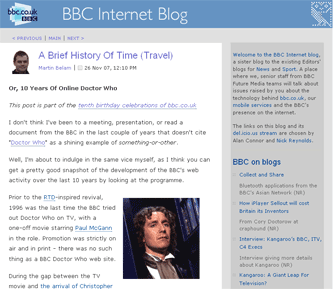Ten years of BBC Online
This week the BBC's Internet Blog published the last of ten articles they commissioned from me about 10 years of the BBC's website. I was to delighted to see they emerged relatively unscathed from being sub-edited - in fact in a couple of cases either Alan or Nick supplied names or details where I'd written 'somebody', and added better pictures.

The ten articles were:
- A brief history of time (travel)
- Developing search at the BBC: Part 1 - Part 2
- The BBC's Homepage On July 7th 2005
- Mind The Gaps: The BBC's Website Archives
- "And If You'd Like To Contact The Programme...": Part 1 - Part 2
- Remembering myBBC
- Herding Digital Cats: Part 1 - Part 2
During the course of it I got to see my Doctor Who piece mentioned on some fan news sites. I should also point out that whilst my 'Remembering myBBC' piece was languishing in a 'pending' folder at the BBC, Andrew Bowden, who used to actually work on the service, wrote a similar piece about the obvious parallels with the new BBC homepage beta. He's also written his own whistle-stop tour through his years at BBC.co.uk central.
The ten year pieces were like having a blog carnival all on one site. Highlights for me included Brandon Butterworth's take on the history of the BBC online. There has been a lot said in public recently denigrating the BBC's technical infrastructure. As frustrating as it could be at times to get new applications deployed, it shouldn't be forgotten that whether it was R&D, BBC Technology or Siemens running the servers, or September 11th 2001, or July 7th 2005, or just a regular rainy Thursday in February, they hold up pretty well and serve an astonishing array of streaming content.
I enjoyed hearing the blood-on-the-carpet executive pain of Katharine Everett and Mike Smartt when faced with seemingly impossible deadlines and BBC in-fighting, and it was great to hear again from John Drori. I had tea and biscuits with him on my second day and his last-but-one day at the BBC. That same night was the 2000 BBC New Media Christmas party, held at the Natural History Museum - he bumped into me and said "Didn't I mention? We do this every Tuesday..."
Frankie left a comment on the last of my 'Blogging at the BBC' posts asking some specific questions about what it was like to guest blog for the BBC which I thought I'd answer here:
Do you enter the text directly, or does someone else do it?
Someone else does it. I sent the BBC marked up HTML, the images, and a Microsoft Word 'guidance' version which showed where I thought the images should go.
Is your post 'checked' by someone higher up first?
It was sub-edited, so there was some nip'n'tuck, but no major difference from what I wrote. I don't know if anything got referred up - I like to think I have a pretty good grasp of the BBC's Editorial and Blogging guidelines so would have stayed within them. And actually, where I noticed any editing differences, they seemed to be an improvement.
Do you get to read/moderate the comments?
No. But I assume they would have told me if I had been receiving more death threats.
Do you check the log stats and referrers?
No. However, my ego/vanity alerts on Technorati and Google et al are such that I think I caught them all anyway.
Are you allowed to re-post to your own blog?
When I did some blogging for the reboot competition last year I made sure I got permission to re-use the content on currybetodtnet up front. I didn't remember to do that this time. There isn't much point re-posting the whole thing IMHO - all you do is divide the potential magic Google JuJu, risk a duplicate content penalty, and split any potential conversation about the articles. Having said that, I always try and provide print versions of the longer articles, so I have produced for download a PDF version of the complete set of posts as they appeared on the BBC Internet blog.